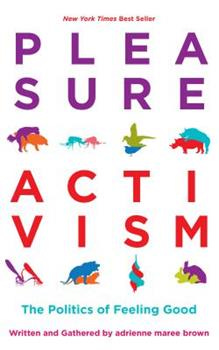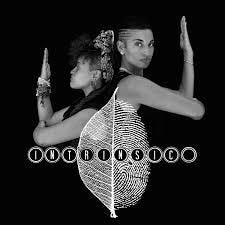Christina deVillier: Credit Where Credit is Due: a black feminist reading list for the world we want to be
When we acknowledge our teachers, influencers and collaborators, we’re celebrating that we can change, that relationships change us, that we’re in this together.
Christina deVillier is a writer, a gardener, and a fourth-generation explorer of northeast Oregon's mountains, canyons, and communities.
A Black Feminist Reading List for the World We Want to Be
Almost exactly a year ago, on a hunt for New Years inspiration, I was scrolling the archives of a podcast I love and landed on a glorious listen: an interview with activist, changemaker, and doula adrienne maree brown. The subject: “Pleasure as Birthright.” Entranced by brown’s invitational curiosity, her crystal-clear biocentric and humanist values, and her call to “be the change” we want to see in the world by leaning into our deepest, most precious “yes,” I immediately listened to the interview all over again and then ordered her book Pleasure Activism from my local bookstore (shout-out to the Bookloft, a rural eastern Oregon gem).
I read Pleasure Activism as soon as it arrived, in February, and let me tell you: this book delivers. It wasn’t exactly what I expected, wasn’t just more of the voice and perspective I’d been so attracted to in the podcast; rather, the book interweaves interviews and shout-outs, diaristic explorations, practices and invocations, paradigm-shifting synthesis, and essays by a number of different “pleasure activists” and muses. At first bewildered, I soon came to admire the way brown practices what she preaches: decentering the lone and lonesome thinker or “creator” and attending, instead, to role models, networks, and lineage—upholding community, polyphony, meaning-making through collaboration across time and space.
The book is a beautiful lesson in giving credit where credit is due: centering those we’ve learned from and the deep pleasure of learning together. This, on its own, is liberatory, I think. When we acknowledge our teachers, influencers and collaborators, we’re celebrating that we can change, that relationships change us, that we’re in this together.
So, in that vein, I’d like to invite you into the black feminist imaginarium that revealed many important lessons to me in 2020. The resources on this list belong to a specific lineage, or perhaps a specific constellation, of thinkers, whom I tracked backward and outward starting with brown’s book (or, in some cases, came to by other routes and tracked back to brown’s book). All of them orient toward collective liberation in tune with values, life energy, and longing. The folx who came first made space for the folx who came later, and were, in some cases, discovered and recovered by their intellectual inheritors.
It was a coincidence (if anything is a coincidence, which I’m starting to doubt) that I was connecting these dots through a year when so much racial tension was exploding and racial consciousness unfolding in this country—including, of course, dramatically on the streets of Portland, a place I love and where I’ve sometimes lived. As last year’s conversations got more heated and the news more intense, I was grateful for this reading list, grateful to be guided by a community of thinkers who believe that connection, passion, and wellness are the forces that bend the long arc of the moral universe toward justice.
So, the list:
Pulling directly from resources named in Pleasure Activism, I reread Audre Lorde’s “Uses of the Erotic: the Erotic as power.” In Lorde’s imagining (more potent now than ever), getting in touch with the erotic, with our life-seeking life-multiplying core desires, makes it impossible to settle for mere survival: “As we begin to recognize our deepest feelings,” she writes, “we begin to give up, of necessity, being satisfied with suffering and self-negation, and with the numbness which so often seems like their only alternative in our society. Our acts against oppression become integral with self, motivated and empowered from within.”
I also decided to give Octavia Butler another chance. Adrienne maree brown is a Butler disciple. I’d been about 50/50 on Butler’s work before last year, loving Bloodchild, rather disappointed with Kindred. To start with, I ordered the Xenogenesis Trilogy. These books are great. They queer our planetary future by introducing empath bioengineering aliens bent on hybridizing with human survivors of nuclear apocalypse. How strange might we be willing to become to ourselves if it meant smoothing away the parts that are self-destructive?
Alice Walker is the person who said “We are the ones we have been waiting for”—a call to practice our freedom, to materialize our dreams in our actions and communities, now, not in some far off future after we’ve “won.” While house-sitting last December, I’d picked up and begun Walker’s The Temple of My Familiar, her encyclopedic follow-up to The Color Purple. I was immediately struck by its navigation between subjugation and pleasure across generations and centuries. So, soon after closing the cover on Pleasure Activism, I added Walker’s book to my library and finished it. Wow. The Temple of My Familiar is a huge, absorbing, magical-realist dance through the African diaspora in the Americas. It explores every embodiment of human thriving through and despite oppression.
Soon after finishing Walker’s book, I was perusing an out-of-the-way shelf in my childhood house and came across Zora Neale Hurston’s Their Eyes Were Watching God. I pulled it down, recalling an essay of Hurston’s I loved in school, and immediately noticed the cover blurb—by Alice Walker. “There is no book more important to me than this one.” Great! I thought. Here’s the next link in the lineage. Reading it, I couldn’t believe I’d never read it before. Its story of a woman growing into liberated adulthood in the self-made black rural south was exhilarating, mythic, and sad. As it turns out, Walker is largely responsible for reintroducing American readers to Hurston.
Reading Hurston made me want to get back to Toni Morrison, who pulls some of her awakenings and longings from Their Eyes Were Watching God. I’ve always loved Morrison’s portrayal of black rural life in Beloved; her characters, in tune with the land and their senses, find freedom and nourishment in community, finally. I proposed we pick up Song of Solomon, Morrison’s book about flying and returning to roots, in our book club. We’re reading it right now. It was published in the late 70s. The chapter I finished yesterday contained a devastating primer on racial inequity in criminal justice, centered on the murder of Emmett Till.
“Black wellness is the antithesis to state violence,” says Mark Anthony Johnson in this amazing essay, “Wellness and the Black Molecular Future.”
Speaking of afrofuturism, reading the Xenogenesis Trilogy made me want more: more of Octavia Butler’s writing, and more black women’s sci-fi. I’m especially interested in visionary fiction that unpacks our relationship with the earth; knowing this, a couple of different friends recommended N. K. Jemison’s Broken Earth Trilogy. I went for it. Jemison’s core world-building concept in these books is a toxic codependency between earth-mage humans and an abused, strip-mined, masculinized “Evil Earth” who has—or so the story goes—grown to hate the thieving beings “infesting” his surface. This foundational anxiety was devastating and compelling. I think of Alice Walker writing “the Earth itself has become the nigger of the world.” Fundamentally, I believe that humans mistreat and brutalize one another in exactly the same ways that we mistreat and brutalize the earth and other species. Everyone has their appropriate and urgent arena(s) of focus in the work to heal this dynamic. On some level, all justice work, all healing work, all work to repair relationships is ecological work.
As an effort to dismantle and return to earth the violent tools that have been created by humans to destroy life and each other, there’s no more compelling vision in the world today than that of Lead to Life, a liberatory art + justice organization that invites the families of the victims of gun violence to ceremonially melt down weapons to turn into shovels to plant trees. Lead to Life’s co-founder Brontë Velez’ poem / ritual “The Well Prophecy” makes me cry every time I listen. Mark Anthony Johnson’s essay, linked above, is a core inspiration for Velez and Lead to Life.
Re: planting trees and reclaiming wellness in partnership with the land: Leah Penniman and the black + land liberation work of Soul Fire Farm. Also, in our own neck of the woods, I hope you’ve heard of Mudbone Grown—if not, please check them out and support farmers of color to build sustainable land-based businesses despite layers upon layers of historical and present inequity in land access in Oregon (and across the nation).
Leah Penniman’s sibling Naima Penniman is one of the voices powering the spoken-word musical duo Climbing PoeTree. Their album Intrinsic is one of my favorite listens of last year. If you were blown away by Amanda Gorman’s performance at the inauguration, give Climbing PoeTree a listen.
Re: more Octavia Butler: the Parable novels. “All that you touch, you change. All that you change, changes you.” Just read them. They’re the most divinitory climate fiction on the market, written in the 80s about the (frighteningly accurate) drought-and-MAGA 2020s.
Toward the end of last year, I returned to adriene maree brown, diving into Emergent Strategy, which is basically biomimicry for social movements: a book about “getting in right relationship with change.” I highly recommend it. I also just ordered her newest book, We Will Not Cancel Us. Based on the great thinking in this essay, which shaped the new book, I can’t wait to read it.
The humans on this list centered and grounded and inspired me over the whole crazy course of 2020, from burning planet through pandemic through protests and exhausting dirty unprecedented politics. I’m so grateful to these mentor-thinkers for their work, and thrilled that this constellation of art and story and strategy is available to help us navigate these times, to grow and dance into the future we want to be.
I hope these resources hold space for you, for all of us, to center our deepest longings, our wellness and wellsprings, as we work for change and justice. That work takes bravery, as Amanda Gorman potently reminds us. And if we’re doing it well, it should feel good, too.
***********************************
Keep the conversation going:
Facebook (facebook.com/oregonway)
Twitter (@the_oregon_way)
Check out our podcast:





